Energy, Money, and Security: for whom?
The Andaman Sea, southern Myanmar // 60 kilometers offshore south of Myanmar lies Yadana, the main natural gas field of the country. Natural gas sources have become a hotspot of geopolitical involvement in the ongoing political upheaval inside Myanmar as oil and gas rank as the top profit-making businesses for the coup-making military junta.
Investment in natural gas provides significant revenue for Myanmar. According to the latest government budget, Myanmar’s oil and gas sector brought in 2,018 trillion kyats (US$1.5 billion) in the 2019/2020 fiscal year, with about 80 percent of that coming from offshore gas. These offshore projects are led by foreign investors and a conglomerate linked to the Burmese military, Myanmar Oil and Gas Enterprise (MOGE).
On January 21st, 2022, TotalEnergies withdrew from the Yadana project citing “the deterioration of human rights” after the coup d’Etat in February 2021. The action was welcomed by the NGOs, but the human rights situation in Myanmar hasn’t improved in any way. One year on, the people continue to be suppressed and now the Burmese military regime has gained more shares in this international collaboration joint venture.
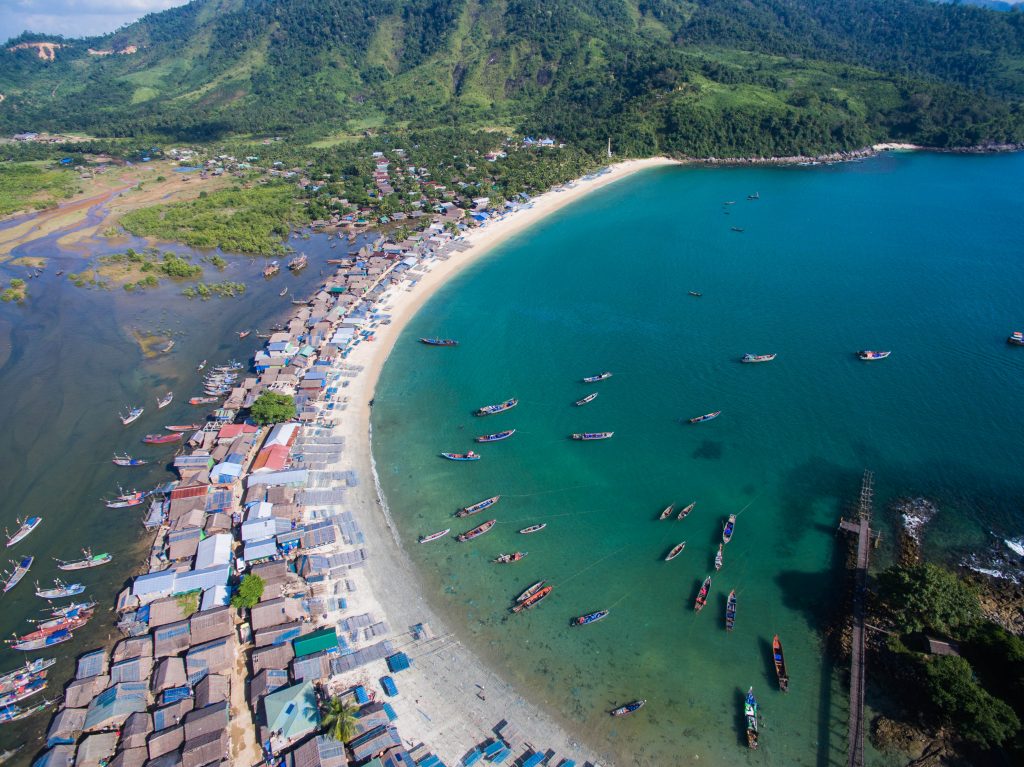
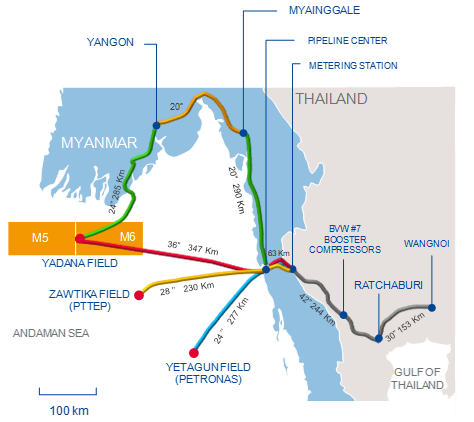
In 1995, the French giant Total won the bid opened by the Burmese military regime and three years later began operating the main natural gas field “Yadana” (meaning ‘Treasure’) in the Gulf of Motamma, southeast Myanmar. The project produces about 770 million cubic meters of natural gas per day (MMSCFD), 65% of which is converted into electricity and exported via a 346 km underground pipeline through the Tanintharyi region, to gas separation plants in western Thailand. The rest is used to supply Yangon, the capital of Myanmar, which still suffers from regular power cuts, which have worsened since the coup to the point of despair.
TotalEnergies (France) held the majority stake (31.2%) alongside the three other shareholders, Chevron (United States), PTTEP (Thailand) and MOGE. After the coup d’etat in 2021, Burmese activists and international organizations have been pressuring the investors to take action up to their commitments in running business in line with human rights standards. A year later, TotalEnergies announced its withdrawal five years earlier before the end of its 30-year contract.
The conditions of this decision were condemned by Burmese activists as the redistribution of Total’s shares allows the military to rake in even more money. The Earth Rights International NGO estimates that MOGE has received $2.1 billion in 2021/2022, after a 65% increase in the price per unit paid by Thailand to Myanmar.
Under the contract, the French company’s shares were divided between the remaining joint venture partners for free. Chevron took the majority share and now holds 41.1%, while PTTEP becomes a 37.08% shareholder. MOGE now holds 21.8%, up from 15% previously.
“Because TotalEnergies left and gave up their shares, MOGE now has more money. We never ask the foreign companies to pull out from Myanmar but we are asking them not to pay money to the junta.” condemned Aung Aung, representative of the Blood Money Campaign (BMC). BMC aims to close the tap on the flow of money in the energy sector, the main source of income for the military.
They quit in a very irresponsible way. No one knows what they negotiated with the military
Historically, TotalEnergies is no stranger to controversies over the Yadana gas project. In 2005, the company was sued in Belgium by four Burmese refugees who accused it of complicity in forced labor and abuse by the Burmese military during the construction of the pipeline. But the lawsuit was dismissed.
During the previous era of military rule in the 1990’s, anti-dictatorship advocacy groups didn’t collectively focused on this main source of revenue for the generals and cronies running the country, according to Aung Aung. He believes that a shifting of this tactic would be a gamechanger in the current revolution.
In 2019, TotalEnergies paid $229.6 million to Myanmar, including $178.6 million to MOGE for gas produced and sold and $51 million in taxes to the Ministry of Finance, according to Reuters Factbox.
The campaign is calling on companies to stop paying MOGE and redirect these revenues to an escrow account, an alternative account that the junta-controlled company could not use and that would be protected until an elected civilian government takes power. Total’s decision to leave Myanmar allowed the Yadana project to operate in the same way, with revenues continuing to flow into MOGE’s pocket.
The announcement of Total’s withdrawal in late January was followed by European Union sanctions against MOGE a few weeks afterwards. These sanctions include asset freezes – blocking bank accounts – and visa bans for people connected to the company but did not attempt to divert payment to an escrow account following BMC’s recommendations.
Still, the markets have taken note. The Dow Jones Sustainability World Index announced that reinstated TotalEnergies was brought back to the list after excluding it in 2021. Instead, the same index recently cut out Yadana’s new operator, PTTEP.
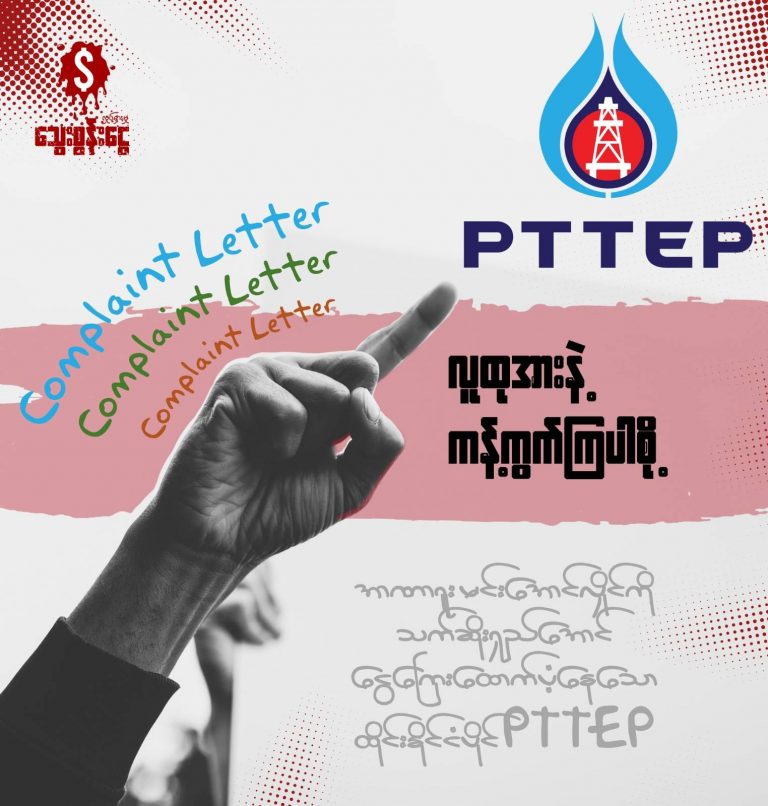
The company is a subsidiary of PTT group, Thailand’s state-owned oil and gas conglomerate which runs an all-in-one petroleum business. This model is also implemented in the Yadana project, where PTT subsidiaries manage the entire chain, from exploration and extraction of oil and gas deposits in Myanmar to their refining and supplying in various forms in power plants in Thailand.
The geopolitical game linked to natural gas investment has now shifted the focus from Western to Asian countries which brings more complicated conflicts of interests. Many Myanmar neighbors who import natural gas for their electricity needs, can be considered as “military-inclined”.
Since the 2021 coup, Thailand has not taken a concrete stance to condemn the military’s actions in Myanmar. Members of the Thai military government, themselves in place since a 2014 coup in Bangkok, meet regularly with the Burmese junta’s leadership. Although Thailand became the first country in Asia to adopt a national action plan on business and human rights in line with UN guidelines, the country is still failing to implement it.
This is not only happening in the case of Thailand but also with China which runs the double oil and gas pipeline from Rakhine to Shan states at the Myanmar-China border.
In addition to its role as an investor in gas field projects in Myanmar, the Thai PTT Group is also the sole buyer of Myanmar’s gas, which it sells to power plants in Thailand to generate electricity. Natural gas is the main fuel for generating electricity in the neighboring country, and 10% of that fuel is imported from the Yadana field.
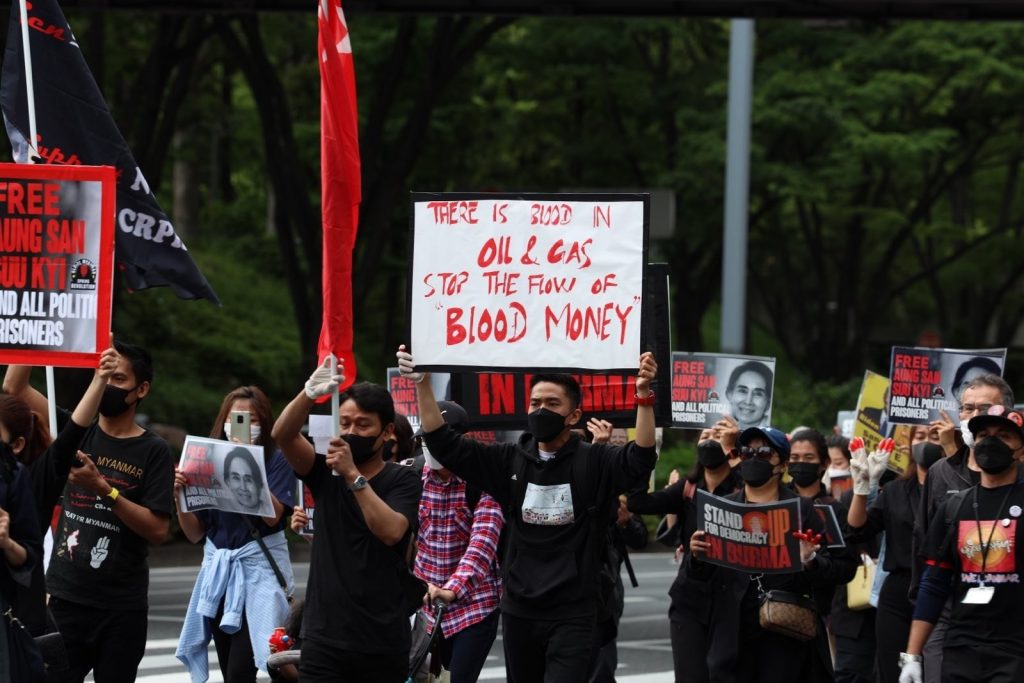
Together with Thai civil groups, the Blood Money Campaign is pointing to the remaining shareholders in the gas project, particularly the PTT group. They call for a boycott on all related businesses including the franchise coffee shop and the gas stations owned by the Thai conglomerate. But PTTEP’s dual role as a provider of a necessary public service but an accomplice to a criminal regime complicates public sentiments about the boycott campaign against the Thai oil and gas giant.
Closing the Myanmar tab, the cheapest source of natural gas for Thailand, could double the electricity price in the country as the price of natural gas from the Gulf of Thailand has higher operating costs. The price of liquefied natural gas (LNG), an alternative source, is rising since Russia invaded Ukraine.
“But it is possible to work it out if the Thai government takes a political stand, decides not to go into Myanmar anymore and organizes to endorse the price increase. Thailand has the capacity to replace this fuel with other sources. The technological transition would take some time. But it is not too difficult,” Witoon Permpongsacharoen, an energy expert and founder of the Mekong Energy and Ecology Network (MEE-NET), told Visual Rebellion.
According to him, the issue of Myanmar natural gas is the tip of the iceberg made of heavily centralized energy sectors both in Thailand and Myanmar. Globally, the environmental movement has encouraged the transition from natural gas, an extractive fossil fuel, to other renewable energy sources such as locally-run solar power and small-scale hydropowers. But successive governments in the two countries have long been delaying such schemes and still heavily rely on natural gas.
It’s all about politics and business
Myanmar military regimes especially have been using natural gas as a high-profit commodity scheme thanks to obscure deals with foreign investors.
TotalEnergies’s public statements about their decision to quit the Yadana project may show some political and humanitarian concern. But many experts have suspected that this move is more linked from the fact that Yadana gas stock is depleting and will be dry in the next couple of years.
Today, the only remaining Western investor in Yadana is Chevron. The American multinational has announced that it will follow the French company in its withdrawal from the country. Yet there has still been no concrete action and the Biden administration has not imposed sanctions on MOGE in the Burma Act enacted by the U.S. Senate in December 2022. The Burma Act aims to authorize humanitarian assistance and support for civil society, promote democracy and human rights, and impose targeted sanctions regarding human rights violations in Burma.
So far, the Thai PTT group doesn’t show any attempt to quit Myanmar and it has been reported that it would also take over the Chevron shares, in case the American company finally chose to seize its operations in the Southeast Asian country.
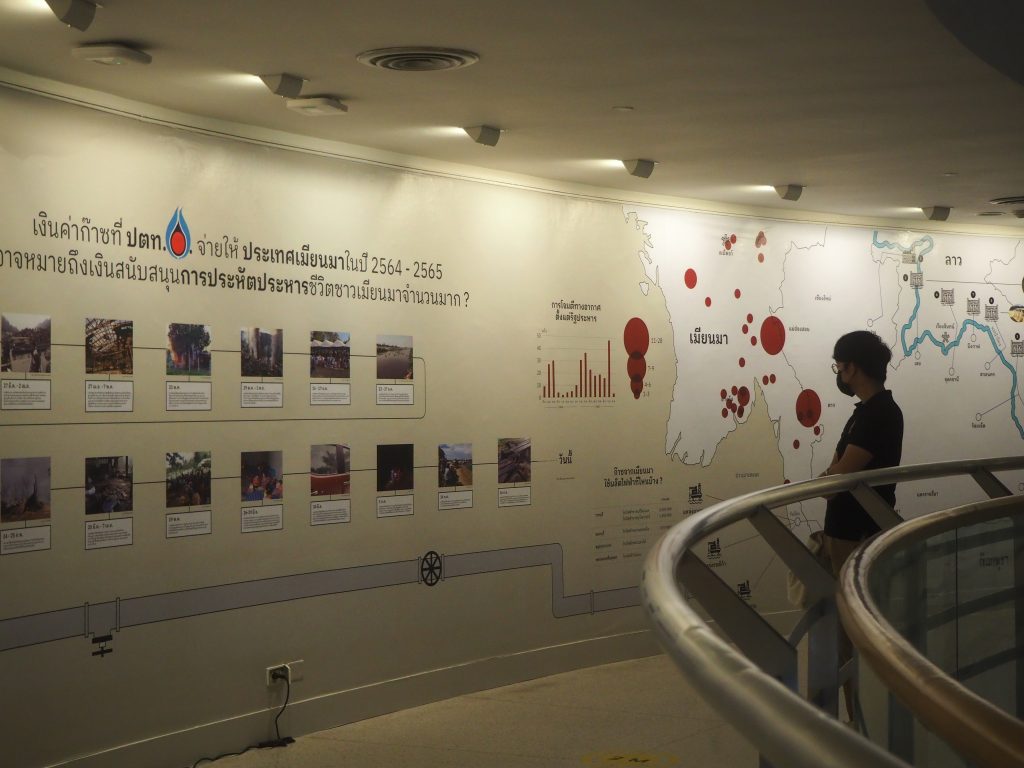
PTTEP did not respond to our reporter’s interview request on why the company is pursuing its operations of the Yadana gas field in light of international sanctions. It has published though some answers to the public opinion, which is deeply concerned by the horrendous human rights violations perpetrated by the military junta in Myanmar. However, it also claimed that maintaining their projects is important for long-term energy security in both Thailand and Myanmar.
PTT never disclosed transparent information about their payment to MOGE. Reuters has calculated that based on figures disclosed by Total and PTTEP’s shares in Yadana, PTTEP payments could have amounted to close to $500 million between 2015 and 2019.
The company hasn’t publicly addressed the proposal from BMC to redirect the payments to MOGE to an escrow account, an alternative account that the junta-controlled company could not use and that would be protected until an elected civilian government takes power.
Recently, the Burmese local media has reported that Myanmar’s Ministry of Defense has been invited to a military meeting and exercise in February 2023 co-hosted by the United States and Thailand.
“Successfully applying public pressure on the giant companies is very difficult,” said Aung Aung “But the most powerful power in this world remains people’s power and I believe in it.”
You can read a version of this story focused on Total in our French partner publication Mediapart.
You can also read our academic report on the shifting power dynamics around the pipelines in Myanmar to China and Thailand on Researchers’ Republic.